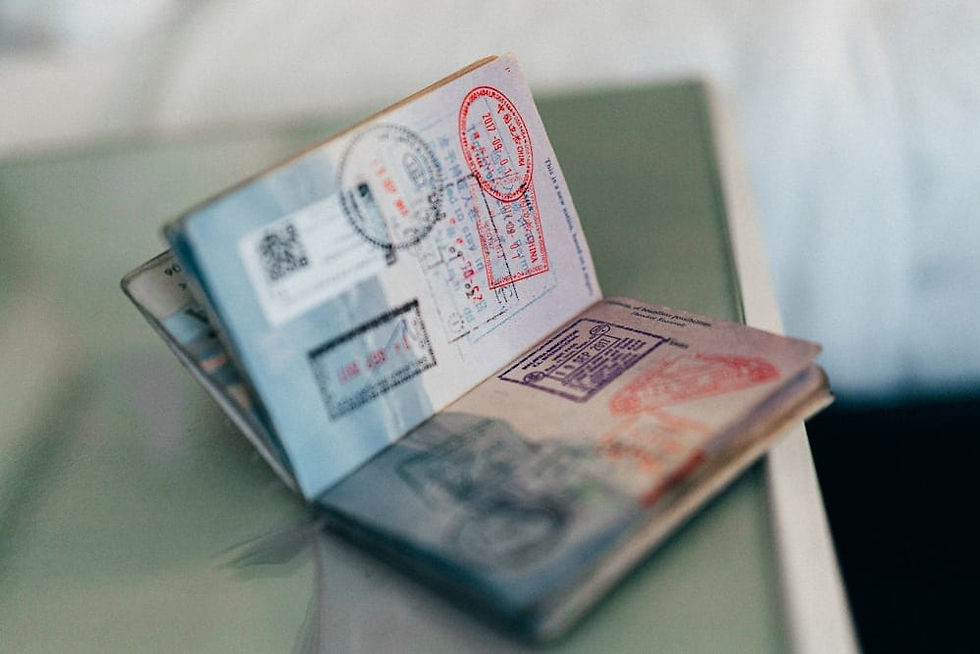Understanding the Visa Interview Process for the USA
- Uninxt Team
- Jul 29, 2024
- 4 min read
Updated: Feb 7
If you are an Indian student with the American dream of studying in the USA, this article is for you. The USA has a lot to offer for international students: diverse programs, state-of-the-art infrastructure, well-paying jobs. One could go on and on about the excellence of the American.
All students aspiring to pursue higher education in the USA must apply for and obtain a student visa. The F-1 Visa (Academic Student) allows an international student to enter the United States as a full-time student at an accredited college, university or other academic institution.
Let's map out the process involved in applying for a F-1 Visa step-by-step:
1. Receive your acceptance email from a SEVP-Approved School: The first step is to ensure that you are accepted by a Student and Exchange Visitor Program (SEVP)-approved school in the USA.
2. Pay the SEVIS fee: Pay the Student and Exchange Visitor Information System (SEVIS) fee. Obtain and carefully maintain receipts for further documentation.
3. Receive form I-20: Once you have been accepted into a university and have paid the SEVIS fee, your school will issue you form I-20 (Certificate of Eligibility for Nonimmigrant Student Status).
4. Complete the DS-160 form: The next step is to fill out the online Nonimmigrant Visa Application (DS-160) form.
5. Pay visa application fee: Pay the non-refundable visa application fee.
6. Schedule visa interview: The final and perhaps most crucial step is the visa interview. Schedule an appointment for a visa interview at the US embassy or consulate in your nearest city.
How to crack your visa interview?
Students appearing for the Visa interview frequently make this terrible blunder: they go in there with no preparation. It is important to acknowledge that this interview is a decisive step in your study abroad journey. Make sure to give it your all! And..don't worry, we’re here to help.
Stay with us till the end to discover 5 top strategies to crack the interview as quoted by a former Visa officer:
You are not special to the visa officer: Let's get this straight, the visa officer is typically reviewing thousands of applications each day. The officer lacks the time to evaluate you comprehensively. This is why it is important to answer any questions the officer may ask as scrupulously as possible.
Be an active interviewee: Listen to the questions meticulously before you begin to respond. Rather than going about the interview passively, lead the conversation actively. For instance, let’s assume that the interviewer is asking you a question about what your parents do for a living. ‘My parents run a business’, as you can see, this is a vaguely passive answer. What you must do instead is briefly talk about the nature of your parents' business.
Refrain from repeating information the officer already knows: When you start answering a question, you may sometimes give out information that the officer is already aware about. This may include things like the name of your university or your hometown.
Be clear about your goals: Research your chosen program thoroughly. Be prepared to discuss the course details. You may be asked questions regarding why you chose a particular program or why studying in the USA is important for you.
Do not appear too nervous: Experiencing some amount of anxiety during your visa interview is completely normal. But appearing overly nervous, unprepared or lacking confidence during the interview may undermine your ability to answer the questions. To become familiar with the process, you may practice common interview questions and answers with a friend prior to the interview.
Here are a few frequently asked questions in the visa interview process:
Why do you want to study in the United States?
Why did you choose this specific university or program?
What are your plans after graduation?
Have you visited the US before
Where will you stay during the course of your program?
Who will be sponsoring your education in the US?
Some FAQs regarding the Visa interview process
What documents should I bring to my US visa appointment?
Carry your valid/renewed passport, your appointment/acceptance letter from the University and other supporting documents for your student visa category. Check the F1 Visa document list here.
Can I extend my stay in the United States if I do graduate within the stipulated time?
Yes, international students can apply for an extension of the F-1 visa in case they need additional time to complete their studies.
Can my family come with me on an F-1 visa?
Yes, your spouse and unmarried children under the age of 21 may accompany you on F-2 visas. However, they must apply for their visas separately and will need to show proof of their relationship to you as well as your financial ability to support them.
We're here to ensure that your overseas education does not remain a pipe dream. For more personal guidance on studying in the USA, book a session with us today.
Please call us at +9196540 23759 or send an email to info@uninxt.com.


Comments